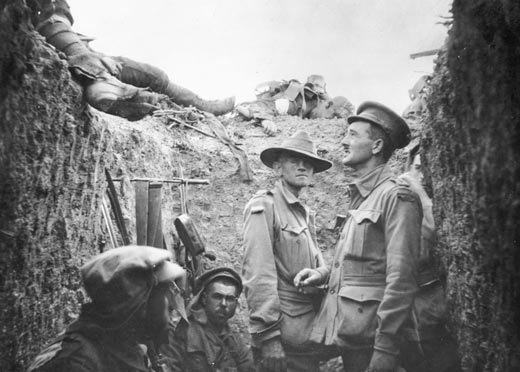
Australian soldiers in a captured Turkish trench
The Gallipoli story is a foundational part of our national heritage, a seminal story by which we define our national character. Yet there is a story from that time in Australian history that remains largely untold, and speaks of the contribution of the Christian faith within that period of great hardship and sacrifice.
I have, since my youth, reflected on those young men setting off to war in 1914, impelled by the sense that they were doing their duty for Empire and instilled with a naive adventurism, absent of any anticipation of the horrors of warfare that lay ahead.
More recently I discovered the little-known tale of the contribution made to our national story by Oswald Chambers, a Scottish-born poet who left his post as principal of a Bible college in London to be stationed in the Egyptian desert to minister to troops travelling to and from the Gallipoli campaign. Chambers left a heritage that has influenced millions through the daily devotional My Utmost for His Highest.
What distinguished Chambers was his unwavering constancy of faith, even in the face of the war. Perhaps the best means to describe the heritage left in the hearts of those with whom he came into contact is through the words of those who experienced his ministry in a tent in the Egyptian desert. Theo Atkinson recorded:
“The hut was packed with a large audience of Australians back from Gallipoli, a pretty tough lot, their being there at all spoke volumes for the new spiritual influence in the camp [resulting from Chambers’ recent arrival]. Mr Chambers spoke for fully 50 minutes, and with such power and eloquence that there was not a man but was mightily gripped.”
J Stuart Gardiner, an Australian in Egypt at that time wrote:
“The men who listened to these memorable talks of the O.C.’s [as Chambers was affectionately known] returned again to the Line—to its danger and hardship—treasuring the possession of their Bibles, for his words had been like the penetrating rays of a great light which had lit up the darkness of their ignorance and indifference, and brought them face to face with the only thing that mattered—their relationship to God.”
The fruit of Oswald Chambers’ spiritual efforts was seen amongst the men as they travelled on to the Gallipoli trenches, where a Bible study was subsequently held. Chambers wrote in his diary:
“Greenfield who is now up the line, writes of his classes thus—
“Dugout, Holy Land. Delighted to say our meetings are being blessed and I have tried in my feeble way to apply the method you adopt to these efforts night after night. The chaps who are attending are delighted… I place the papers (i.e. outlines) on the sand in the tent, we have one or two candles for light, then lying on our sides, sometimes kneeling all the time, we try to pack into our thinking along Bible lines all we can grip … Two Australians come to my dugout for prayer at mid-day each day.”
John D. Blight, an Australian soldier from Adelaide, wrote of Chambers’ ministry:
“A military camp is the last place to which one would willing go for influences that touch the finer side of life and that speak of things that are age-abiding; but at the Y.M.C.A. hut [in Egypt], in spite of the hampering influences of militarism, men were brought face to face with a greater reality than the grim reality of war. The memory of days spent with Oswald Chambers in Egypt surpasses in vividness all other memories, and eclipses the physical and mental nausea and discomfort of the campaign.”
Chambers’ association with the ANZAC tradition is virtually unknown here in Australia. Coming up to the centenary of Gallipoli this time next year, I believe his story, and that of the men whose lives his message touched, are deserving of wider recognition.
Mark Fowler is a Christian lawyer and Chairman of CLEAR Australia.
Image: AWM A0202
You might also like:
Email This Story
Why not send this to a friend?

